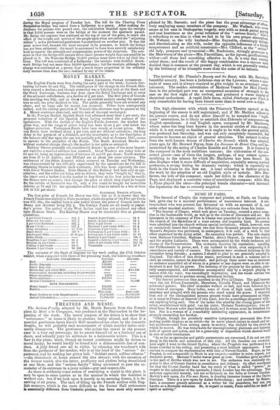THEATRES AND MUSIC.
The Serious Family, adapted by Mr. Morris Barnett from the French piece .Le Mari a la Campagne, was produced at the Haymarket in the be- ginning of the week. The moral purpose of the drama is to show that "seriousness " at home is likely to produce laxity abroad, and that if a married gentleman hears Exeter Hall mentioned too often by the domestic fireside, ho will probably seek amusements of which married ladies ordi- narily disapprove. Tho gentleman who points the moral in the present case is a very sad personage, for he passes himself off as a bachelor out of doors, and actually pays his addresses to a fashionable widow. This is a flaw in the piece; since, though an honest gentleman might be driven to moral laxity, he would hardly be forced into a dishonourable line of con- duct. A jolly friend sets all to rights, by releasing the wanderer's wife from the guidance of her mother, who is at the head of the " serious " de- partment, and by making her give a ball. " Sublet& cau.sa, tollitur effectus " —the dismalness at home caused the sins abroad; with the cessation of the former vanish also the latter, profligacy and pietism being demolished at one blow, and the "serious family" being contented to pass the re- mainder of its existence in a juste milieu—gay and respectable.
As there is evidently some notion of conveying a moral in this piece, it may be open to some queries as to the manner in which the doctrine is Worked out; but if we look upon it merely as an amusing drama, it is de- serving of all praise. The task of filling up the French outline with Eng- lish manners, which is the more difficult as the Exeter Hall seriousness essentially different from Catholic pietism, has been most ably eccom-
plished by Mr. Barnett; and the piece has the great advantagwhom eca
" serious family," that ively employing many members of the company. Mr. Wallaek,s,a seems at his ease in Shakaperian tragedy, acts with so much genial gayety and real heartiness as the jovial reformer of the is refreshing to see him in what we feel to be his own proper atmosphere"it Mr. Webster, as the wily husband—Miss Reynolds, charmingly delicate and discriminating as the wife, under the opposite influences of a kindly temperament and an artificial constraint—Mrs. Clifford, as the " seams old lady, pompous and tyrannical—Mr. Buckstone, strongly grotesque a the Mawworm of the piece—Mrs. Fitzwilliam, as the joyous, goodhunmared widow—all these had something effective to do, in a way that exactly suited them; and the result of this happy combination was a success more decided than is common at the present day, which is not generally marked by the brilliancy of its triumphs more than the noise of its failures.


























 Previous page
Previous page